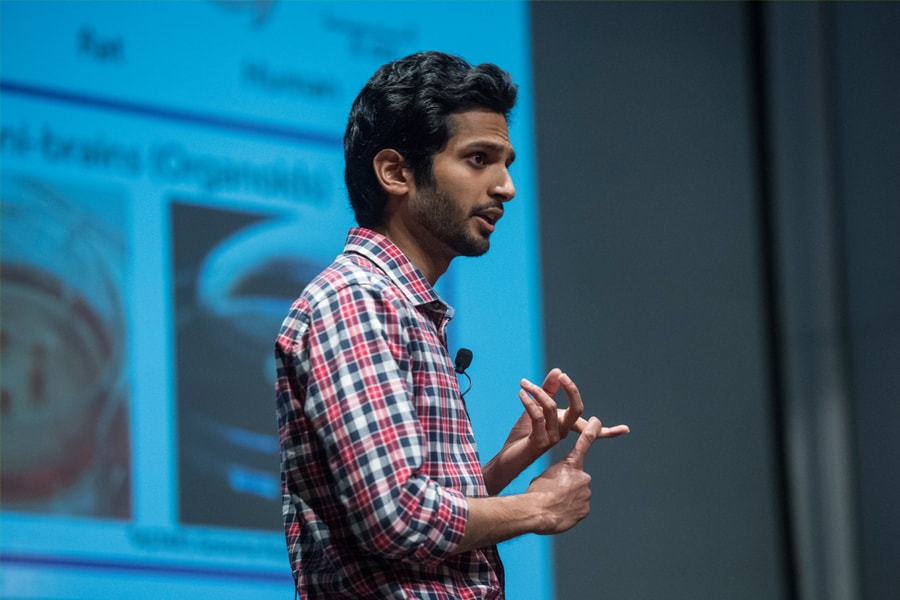
Practice Makes Perfect for Three Minute Thesis Winners
Penman takes first place and People's Choice Award
Doctoral students took the stage at Kresge Auditorium to describe their research and its significance in three minutes or less during the finals of Carnegie Mellon University's Three Minute Thesis competition.
First place and the People's Choice Award — selected by the live audience — went to Will Penman from the Department of English. Second place went to Navid Kazem, who is studying civil and environmental engineering, and third place went to Ardon Shorr from the Department of Biological Sciences. Biomedical engineering student Sahil Rastogi was selected as the Alumni Choice Award winner by alumni watching the Facebook feed.
The event, in its fifth year at Carnegie Mellon, started at the University of Queensland in 2008 and has been adopted by hundreds of institutions in more than 57 countries. University Libraries Dean Keith Webster, who brought the competition to CMU, served as host of Tuesday's finals.
The first-, second-, and third-place winners were all repeat participants, who had competed in at least one other Three Minute Thesis competition.
For first-place winner Penman, whose presentation invited the audience to participate in a call and response exercise, this was his second attempt.
"For me, this year it was about having a sense of fun attached," Penman said. "A lot of times, academic research can be kind of dry, so I really wanted to have this sense of being called into something. I'm calling the audience into a call-and-response and that mirrors what I'm doing in my dissertation to think about race and being called into a deeper interaction."
Shorr, a doctoral student in the Mellon College of Science who was a finalist in CMU's first Three Minute Thesis competition, also was participating in his second championship.
"My first Three Minute Thesis talk was about why so many astronauts return from space with health problems," Shorr said. "This time, as my work has evolved, I'm talking about how we can learn about proteins in the body using astronomy software. It's a story of building tools by learning from other fields."
As a co-founder of the student group Public Communication for Researchers, which helps graduate students explain their work and why it matters, and a former presenter at TEDxCMU, Shorr approached the finals with experience in public speaking.
First-time Three Minute competitor Carla Viegas, a student in the School of Computer Science's Language Technologies Institute, recognizes the value of presentation skills.
"The reason I wanted to compete was to step outside of my comfort zone," said Viegas, who presented her research on stuttering. "Even if you have great research, but don't communicate it properly, not even peers will be able to build upon your work. So I wanted to challenge myself and make my research topic understandable for everyone. Preparing for the preliminary round made me feel uncomfortable, but participating showed me what can be achieved."
Kazem said he wanted the audience to understand the interdisciplinary nature of his work, which features elements of mechanical engineering and physics. His experience in the Three Minute Thesis preliminary rounds in 2016 and 2017 prepared him to take home a prize this year.
"I made it so much simpler," Kazem said. "If you look at my presentation last year, it was too complicated. I learned that there is not enough time to go in depth on your topic. Keep it as simple as possible."